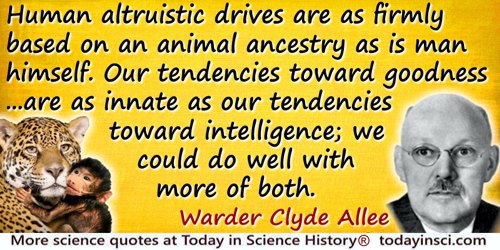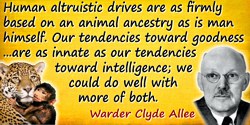 (source)
(source)
|
Warder Clyde Allee
(5 Jun 1885 - 18 Mar 1955)
American zoologist and ecologist who researched the social behaviour, aggregations, and distribution of both land and sea animals. He noted what he called “protocooperation” among animals, unconscious cooperation instead of competition.
|
Science Quotes by Warder Clyde Allee (4 quotes)
At last such field studies have been put on a sound basis which should result in the hunting of information rather than specimens.
— Warder Clyde Allee
Concluding line of Allee’s Review (of Hiram Bingham’s 1932 book, Gorillas in a Native Habitat), in journal, Ecology (1933), 14, No. 3, 320. Note that the quote is authored by the reviewer, W.C. Allee, and any source attributing it directly to Bingham himself is incorrect.
The cooperative forces are biologically the more important and vital. The balance between the cooperative and altruistic tendencies and those which are disoperative and egoistic is relatively close. Under many conditions the cooperative forces lose. In the long run, however, the group centered, more altruistic drives are slightly stronger. … human altruistic drives are as firmly based on an animal ancestry as is man himself. Our tendencies toward goodness, such as they are, are as innate as our tendencies toward intelligence; we could do well with more of both.
— Warder Clyde Allee
In 'Where Angels Fear to Tread: A Contribution From General Sociology to Human Ethics', Science (11 Jun 1943), 97, No. 2528, 521.
The mortal enemies of man are not his fellows of another continent or race; they are the aspects of the physical world which limit or challenge his control, the disease germs that attack him and his domesticated plants and animals, and the insects that carry many of these germs as well as working notable direct injury. This is not even the age of man, however great his superiority in size and intelligence; it is literally the age of insects.
— Warder Clyde Allee
In Chap. 7, 'Some Human Implications', The Social Life of Animals (1938), 240-241. [Books that cite a source of The Social Life of Insects are incorrect. There is no such title in the Library of Congress catalog. —Webmaster]
Widely dispersed knowledge concerning the important role of basic cooperative processes among living beings may lead to the acceptance of cooperation as a guiding principle both in social theory and as a basis for human behavior. Such a development when it occurs will alter the course of human history.
— Warder Clyde Allee
In Cooperation Among Animals with Human Implications: A Revised and Amplified Edition of The Social Life of Animals (1951), 213.
See also:
- 5 Jun - short biography, births, deaths and events on date of Allee's birth.
- Principles of Animal Ecology, by Warder Clyde Allee. - book suggestion.


 In science it often happens that scientists say, 'You know that's a really good argument; my position is mistaken,' and then they would actually change their minds and you never hear that old view from them again. They really do it. It doesn't happen as often as it should, because scientists are human and change is sometimes painful. But it happens every day. I cannot recall the last time something like that happened in politics or religion.
(1987) --
In science it often happens that scientists say, 'You know that's a really good argument; my position is mistaken,' and then they would actually change their minds and you never hear that old view from them again. They really do it. It doesn't happen as often as it should, because scientists are human and change is sometimes painful. But it happens every day. I cannot recall the last time something like that happened in politics or religion.
(1987) -- 


